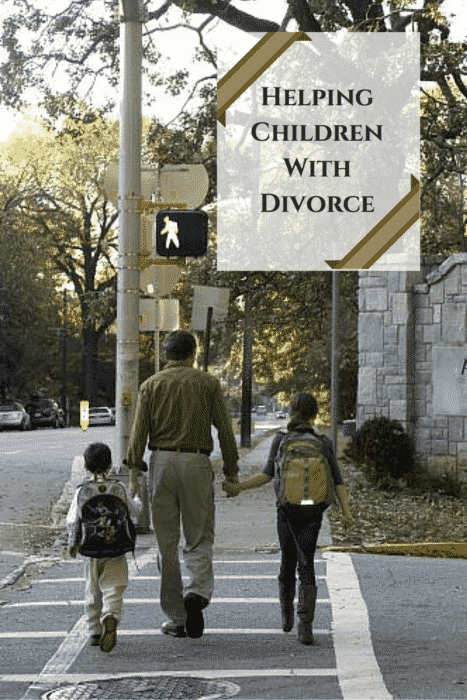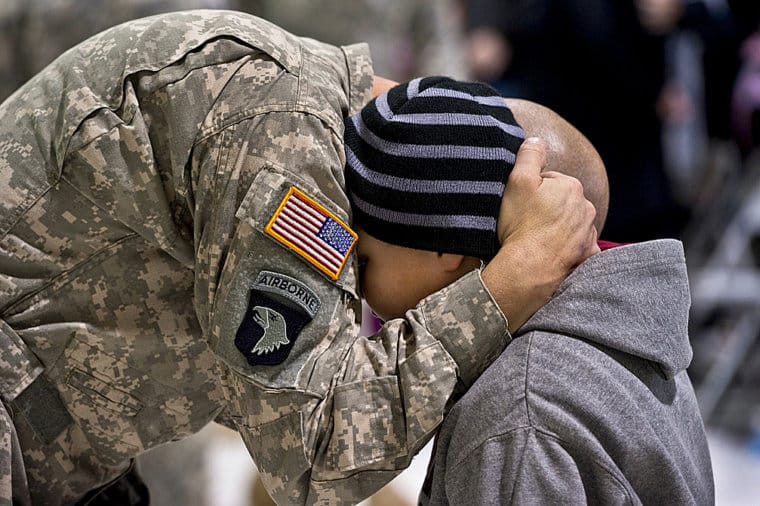 Many families face the challenge of divorce or separation. Whatever the causes of the separation, and whatever the circumstances, it’s hard on everyone involved. Parents want the best for their children. They want stable, loving relationships in their lives. And they want their children to thrive. Yet big changes must be made.
Many families face the challenge of divorce or separation. Whatever the causes of the separation, and whatever the circumstances, it’s hard on everyone involved. Parents want the best for their children. They want stable, loving relationships in their lives. And they want their children to thrive. Yet big changes must be made.
There are many ways of helping children with divorce. This article will outline some steps that are simple, but not easy to do in the swirl of emotion that accompanies separation in a family. Both parents may not be able to agree to take these steps, but for at least one parent to head in these directions will help greatly.
Three sources of hurt to keep in mind when helping children with divorce:
There are three basic sources of hurt for children when their parents separate. One is the loss of the family configuration that has anchored them. The children may retain the relationships, but their homes change, who is at home changes, their parents’ work schedules and their own school situations may change, and their parents’ economic circumstances change. These core changes can feel threatening to children, even if they eventually lead to positive outcomes.
Second, children are often aware of their parents’ raw, unhappy feelings about each other and the depth and intensity of those feelings also rocks a child’s world.
And third, children are built to abide in a loving, cooperative community. The end of a living arrangement they trusted and depended on forces a loss of innocence, a breach in their ability to feel that the world is a safe and welcoming place for them.
Shielding children from unnecessary hurt:
 There are a few commitments that separating parents can make that will shield their children from some of this hurt. These are commonsense commitments, but in a heated situation, they take work to remember. A parent needs to consciously add support and resource to his or her life to keep steering him or herself in a direction that benefits the children.
There are a few commitments that separating parents can make that will shield their children from some of this hurt. These are commonsense commitments, but in a heated situation, they take work to remember. A parent needs to consciously add support and resource to his or her life to keep steering him or herself in a direction that benefits the children.
• When children are present, I will speak and act respectfully toward my child’s other parent, his or her family, and friends. In a stressful situation, a parent’s need to talk and to express anger, outrage, grief, fear, and other deep feelings is strong. Unguarded and extended expression of emotions can be very helpful in clearing a parent’s mind enough to be able to focus on the needs of their children. But parents must seek adult listeners—trusted friends, counselors, rabbis or pastors—in whom they can confide. Children are not at all equipped to listen to parents’ negative feelings about each other. No matter what the other parent has or has not done, children are far better off when parents act respectfully toward one another in their presence. Respect doesn’t imply that one isn’t allowed to set limits with another adult who is behaving poorly. It does mean that, as limits are announced, the limit-setter refrains from personal or physical attack.
• When children are present, I will not display my upsets about their other parent. We humans have a million ways to convey what we’re feeling. When we’re upset, we roll our eyes, heave loud sighs, grunt, stomp, slam, throw up our hands, clench our fists: the litany of expressions of upset is long. None of this is verbal, but all of it is hard on children. They are built to see the expression of love, confidence and relaxed cooperation. Separating parents don’t need to put up a false front, but they do need to model simple decency toward one another. Their displays of upset can be saved for adult company. With an adult who agrees to listen to the feelings, it can be a huge relief to show every bit of the upset. It’s a relief to use choice language, make angry gestures, groan, or pound on the wall. The feelings are there, throbbing for release. Show them to a grown person (not your child’s other parent) who can handle them.
• When children are present, I will not conduct extended arguments with my child’s other parent. Parents can’t help but have differences of opinion and arguments. And some arguments, conducted with ground rules that ban attacks on character and categorical statements, can actually help to rebuild a sense of caring. But in a family that is thoughtful of its children, the meaty part of a fight will be conducted out of earshot of the children.
• I will not recruit my child to agree with my grievances about their other parent. A separation is painful enough for children, without the additional pressure to side with one parent or another. Children love both their parents, and want the best for both their parents. It is heartbreaking to a child to have to choose between them.
• To the best of my ability, I will not assume a victim role. Each parent in a separation feels like a victim, and most feel pulled to cast blame for the breakup. These are our tendencies under stress, because our strongest feelings got their start in childhood, when we were helpless to defend ourselves, and were blamed, or learned to blame ourselves, for any lapses of judgment we had. Attaching ourselves to the role of the injured party tends to keep us from pulling up our socks and building good into our lives in every way that we can.
The feelings of being a victim are probably unavoidable, but we don’t have to believe those feelings. It’s far more constructive to cry hard or rage, with a good listener, until we can see a way to make things work well for us and for our children. When that path isn’t yet visible, it’s still possible to make a commitment to keep taking the initiative, to keep one’s attention on the positive moments and the lessons being learned.
One young child I know, who is battling her fears of being in social situations, cries and rages as she says to herself, “This fear will not win! I won’t let it win!” That’s an attitude that will move her forward, even at the moments when she is stricken with panic. That’s an example of a path out of the victim role.
Working hard at keeping these commitments gives children maximum exposure to their parents’ good will and caring, and minimum exposure to adults in emotional upheaval, and therefore unable to put the children’s interests first.
Handling the hurt of separation:

In order to begin to thrive in new circumstances, children need to offload their feelings about the changes in their beloved family. And parents can help their children regain their confidence after big changes have unsettled them.
Here are a few of the headlines.
• Children often unload their feelings about big, difficult events by erupting over small, insignificant triggers. A child can do an hour of healing work about missing Daddy or Mommy when the corner falls off their cookie, or they spill a drop of water on their pajamas. If you move in, put your arm around your child, and gently refuse to “fix” the upsetting little thing, your child can use it like a can opener. They scream about needing a whole cookie, or a change of pajama tops, and you hold them, look into their eyes and offer love and understanding. So many feelings, so passionately released! After a big cry or tantrum about such a small thing, a child feels much more secure in the world, and much less troubled, because you were there for them. You listened. You cared. He has grieved over something amiss, a small thing that’s a stand-in for the frightening events that he feels overwhelmed by. You’ll see your child relax, if you’ve been able to listen to him all the way through.
• At transition times, make time for children’s feelings to be heard. It’s healthy for children to have upsets around transition times. These are the times when the reminder that things aren’t the same is strongest. Far better to have a child who can powerfully cry that he doesn’t want to leave, or doesn’t want to stay with the parent he’s going to, than to have a child who swallows his feelings and winds up either subdued and separate or aggressive because he has too many feelings to manage. Often, children can fully feel their love for a parent directly after a huge cry about how they don’t want to be with him or her! This is one of the powerful paradoxes around emotional release. A child feels “I don’t want to go to Mommy’s” very strongly, cries hard about it, finishes, and has a good time at Mommy’s after all. It’s not pleasant to hear that your beloved child doesn’t want you, but if those are the feelings stuck inside, then your fastest way to a closer relationship is to assist your child to cry or rage until he’s done.
What do you say to a child who’s rejecting you? In a way, what you say is less important than how you are. Children read body language and tone of voice very clearly. Keep eye contact with your child, and imagine that you are taming a small, frightened animal by showing that you are trustworthy. Say, “I know,” with quiet acceptance, when your child says, “I hate you,” or “I don’t want to go with you!” You can say, “But I want to be with you.” You can say, “You’ll see [your other parent] again soon.” You can say, “I’ll listen to you until you are ready to come with me.” These will be balm for your child’s troubled spirit, though he or she won’t show that it’s helpful until this big outburst is over.
• Make your child’s arrangements. Listen to your child’s feelings about the custody arrangements, and take those feelings into consideration, but parents are the ones who need to make the decisions about when and how custody is shared. To leave children in charge of custody arrangements is too much like forcing them to choose sides. If your child is longing for her other parent while she’s with you, listen to her feelings, rather than cart her back to the other parent’s place. This will strengthen your child’s relationship with you, and will help him/her overcome the stored feelings about separation that have been triggered by the current situation.
• Always reassure a child that their other parent loves them, or would love them well if he/she could. Some children lose all contact with a parent, and some children have parents whose minds are deeply affected by addiction or other difficulties that bend their lives away from effective parenthood. But the underlying truth is that, if their child’s parent were healthier, better supported, had access to more love and opportunity, was blessed with beginnings that were gentle and kind, that parent would be delighted with them. It’s hard to explain human frailty to children, because it breaks our hearts to see them hurt by it. But we need to let them know that it’s not their fault that their Mommy or Daddy isn’t able to be in their life. Something has been missing from their parents’ life. There’s nothing missing in them.
Here’s how it can work:
Here’s a quick story that gives an example of a parent who gathered enough presence of mind to treat her child well in a moment of emotional turmoil. It’s a small picture of a healing moment, both touching and funny. The healing action of emotional release is at work for both mother and child.
“My husband left me suddenly, when my daughter was eight months old. He had been having uncontrollable rages aimed at her, and he left angry, but I think underneath, it was to protect her, and me. He gave us no financial support whatsoever. This made life very difficult for me for several years.
“One day, he called and we had had a fight over the phone. My daughter was going on three years old. I got angry, slammed the receiver down hard, and began to cry. She came in from the other room and said, “Mommy, who were you talking to?”
I said, “I was talking to your Daddy.”
She said, “Oh, I miss him too!” and burst into tears. I picked her up, held her, and we both cried for a good long time about her Daddy. She for her reasons, me for mine.”
—a mother in Palo Alto

